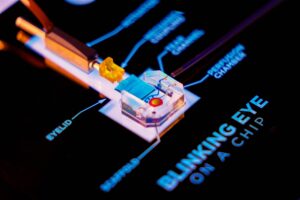
Giving animals a voice in Parliament

The public, industry and scientists all have a part to play, but ultimately we need legislative change to ensure that animals are no longer experimented on and that better human-relevant science is prioritised.
Take action today – Ask your MP to support our plan to end animal testing
While we believe that the use of animals in research is both ethically and scientifically unsupportable, and that there should be an end to all animal testing today, we know that legislation often takes time to keep up with scientific and societal progress.
We are working with experts in the scientific community to put together a roadmap that will take us to a point where the use of animals in research and regulatory testing is no longer legally mandated and there is a prohibition against the use of animals. This is our outline of what we believe is needed.
We know that:
- The cosmetic industry has provided a legal model for the replacement of animal testing in safety evaluation. Though loopholes have been created by other regulations, the landmark European bans on animal testing for cosmetics (in which the UK played a key role) still stand on their own legal merit and have been responsible for a critical turning point towards human relevant, animal free innovation over the last few decades.
- Innovative new methods developed as a result of the cosmetic testing bans are used in other sectors of safety testing and research and can create new business and commerce opportunities. Government funding for human relevant methods currently represents only 0.2-0.6% of total UK biomedical research funding and only 0.02% of the annual R&D (research and development) budget of £10.45 billion (2019-2020) This is woefully inadequate and is holding back UK innovation
- Animal test results lack human relevance, are unreliable, unpredictable and cause unnecessary suffering.
- Animal tests do not correlate accurately to human beings due to inherent species differences from very basic to microbiological levels and despite the industrial scale use of genetically modified (GM) animals to try to overcome this
- Use of existing data should be based on human relevant information in combination with new non-animal methods to drive scientific advancement.
- Technologies continue to advance from basic models (e.g. cell culture, 2D and advanced 3D and organ chip models, or advanced in silico (computer) models ) These technologies can be employed for species -relevant needs in human, veterinary and environmental research
- Animal-free innovation is the way forward. We are not calling for ‘like for like’ replacements of individual (and scientifically flawed) animal tests The solution instead exists in animal-free approaches. By this, we mean appropriate combinations of non-animal methods ( e.g. in silico; in vitro; A.I,(artificial intelligence) as well as existing and new human data) which specifically address the research needs in question and generate paradigm shifting data
As we face a general election, we have seven key asks for the next government in their new term to pave the way to an end to animal testing and move towards Human Biology Relevant Science
Within the first six months, the government should:
- Appoint a Minister for Human Relevant Science to drive the transition, which is necessary to ensure safety for consumer products, food and pharmaceuticals and advance treatments for diseases. This Minister should sit within DSIT and would oversee an annually reviewed action plan (details below).
- Set up an independent expert advisory review body comprising representatives from government, industry, academia, and non-governmental organisations who have expertise in New Approach Methodologies (NAMs). This group will actively engage in pioneering initiatives to advance animal free innovation.
Within the first year, the government should:
- Develop a cross-departmental action plan to accelerate the transition to animal-free research and testing. The roadmap will outline legislative and non-legislative actions, set against timescales to reduce animal testing, with a finite and fixed end date to ultimately end animal testing in the UK as a matter of urgency.
- Commission a mandatory review of all animal procedures to delete redundant, duplicative, and wasteful methods, and prohibit the retesting on animals of any material, chemical, food or drug currently in use for any reason. Retesting requirements shall be addressed exclusively by non-animal methods or existing human data (from clinical trials or epidemiological studies).
- Commit to commencing the amendment of all legislation that requires animal tests to be undertaken, to incorporate non-animal approaches and ‘future proof’ all legislation to allow adaptation to scientific advancements in the development of new non-animal approaches. Legislation must be amended to prohibit the use of animal tests to demonstrate compliance with current as well as future legislation.
Along the way:
- Establish a Central Register of non-animal methods and protocols. This would include all non-animal methods validated to date, but also all methods and protocols which are considered qualified, well defined and well characterised for use. This register would therefore replace reliance on the outdated and lengthy validation process. The register would be overseen and managed by the independent expert advisory review (see above).
We propose this can be done by:
- Diverting existing funding, resources, and expertise to the paradigm shift towards non-animal approaches, including improved use of existing methods combined to meet specific research needs, whilst recognising the need to go beyond ‘like-for-like’ replacement of individual animal tests. Rather than additional government expenditure, reallocating funding offers the potential to create net savings to the exchequer. Current funding for human-relevant methods shows vast room for improvement to foster innovation and realign the UK as a world leader in scientific research.
In addition, here are some of the other existing measures that we support.
PETA’s Research Modernisation Deal, which proposes the following:
- Immediately eliminate animal use in areas for which animals have already shown to be poor and unreliable predictors for humans and have impeded progress.
- Conduct critical scientific reviews to identify the areas in which the use of animals has failed to advance human health and should therefore be ended.
- Implement transparent, robust prospective and retrospective evaluations for all projects using animals and allow for a public commenting period.
- Work with organisations and agencies globally to harmonise and promote international acceptance of non-animal testing methods for regulatory testing requirements.
- Increase funds for non-animal studies and decrease funds for animal studies.
- Educate and train researchers and regulators on the benefits of and how to use non-animal testing approaches
Animal Free Research’s call for the Government to establish a legislative framework that will support the transition to human-specific technologies. ‘The Human-Specific Technologies Act’ would be an important step towards a future where technology replaces the use of animals in medical research, secures much-needed medical breakthroughs, and cultivates a thriving and prosperous life sciences sector in the UK.
- Establishing a cross-sector innovation hub to provide expert input in the transition of human-specific technologies
- Developing a cross-departmental action plan to accelerate the uptake of human-specific technologies
- Appointing a minister for Human-Specific Technologies, who would be tasked with ensuring that progress is sustained and coordinated
- In the longer term. Introduce a new legislative framework that would support a full transition to human-specific technologies
Animal Aid’s call for an immediate end to Lethal Dose (LD50) animal tests. These crude and cruel experiments are almost 100 years old and can immediately be replaced with the AcutoX non-animal test developed by XCellR8.
12:11

